Horror resides in all of us, whether we like to admit it or not. Sometimes it comes out in force, like in war and politics, while others keep it quiet and subtle, like a shark lurking behind the water waiting to pounce. We all give in to our selfish desires and passions, fight for an unworthy cause or harm others to get ourselves further in life.
This brings out all our hearts of darkness.
After our journey through so many great entries in cinema, it is fitting that we arrive at my favorite film and the most poignantly beautiful movie in this countdown - Francis Ford Coppola's "Apocalypse Now."
You might be wondering why, after so many films with positive and uplifting outlooks on our existence, like "It's A Wonderful Life," "City Lights," "WALL-E" and "Ikiru," I would have a movie about mass amounts of destruction and death as my favorite of all time. To tell you the truth, I'm as confused as you are. A movie that seems to have little regard for human life, and this is the one I pick above the thousands I have watched in my life.
Then again, perhaps "Apocalypse Now" values life more than most others on a larger scale. Of all the films on this countdown, this one certainly has the biggest scale, practically covering the full range of the Vietnam War, while taking nearly two years to film everything in the Philippines. We witness an air strike on a large Vietnamese village, see a group of soldiers lose their sanity at the sight of women during a USO show, and men devolve into madness when the chain of command is broken. All leading up to the reveal of a man who has seen people at their best and worst, and wishes to harness the worst of us.
So why is "Apocalypse Now" my favorite film? Because it has everything that I adore about cinema.
In the middle of the Vietnam War, Captain Willard (Martin Sheen) has finally been called upon for a mission, one that no one else was crazy enough to take. Willard is briefed on a decorated military officer, Colonel Kurtz (Marlon Brando), who had gone rogue in the jungles of Cambodia, and was now leading his own personal military that worshipped him like a god, killing anyone that Kurtz saw fit. Willard's mission is to take a navy patrol boat up a river that snakes through the war, find Kurtz and "terminate with extreme prejudice."
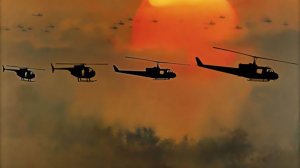
"Apocalypse Now" is based on a Joseph Conrad novel, "Heart Of Darkness," but changes the setting from the rough and rabid Congo jungle to the Vietnam War. What we get is a film with two distinct morals about the world. One is rather simple - war is hell. The other moral comes from "Heart Of Darkness" as well, that the way we live our lives is fragile and insignificant compared to what nature is capable of.
We are a tiny bird sitting atop the maw of a massive crocodile, that could strike us down without any remorse or consideration and without any notice. Nature is cruel and inconsiderate, and living our normal lives is merely a reprieve from that information.
In many ways, "Apocalypse Now" is like "The Treasure Of The Sierra Madre," with both having a loose main plot thread holding the film together, but the majority of the movie is taken up by smaller bits that reveal much about our characters, and in turn about our darker side.
While Willard spends the first two-thirds of "Apocalypse Now" traveling up the river, only sometimes mentioning Kurtz, we get to spend this time watching our characters struggle to understand what it is we are doing in Vietnam, and how to handle a war.
One of the biggest examples of this comes in the now famous "Ride Of The Valkyries" sequence, where a flying cavalry unit, led by the blunt yet dedicated officer Kilgore (Robert Duvall), decide to attack one of the hottest Vietnamese villages in the area, just to claim the only spot in Vietnam that has good waves to surf. They blast loud classical music from their helicopters, while they decimate this village and burn it to the ground in a sea of napalm.
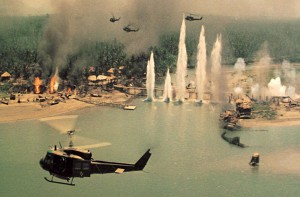
This is the scene that people point to when talking about "Apocalypse Now," and I cannot blame them. One of the crowning achievements of this film is the cinematography, with this scene standing out above the others, as we watch the helicopters rise out of the jungle and into the morning sun. Or watching the copters fly just inches above the large surf they are fighting for, while "Ride Of The Valkyries" is blasted for all to hear.
However, when I think of "Apocalypse Now" there is one scene that sticks out above the others. It is similar to the famous helicopter sequence, but has a bit more subtlety to it. The Navy patrol boat escorting Willard up the river has come across a suspicious looking Vietnamese boat and decide to stop and inspect it, much to the dismay of Willard and most of the other soldiers. They viciously pull the family from the boat to inspect, tearing their fruits and vegetables apart, in the hopes of finding something illegal. When Chef (Frederic Forrest) reaches for one corner of the boat, one of the women rushes beside him, and the crew opens fire on the family. Afterwards, Chef checks what she was reaching for - her puppy.
In each case, you cannot blame either party for how this went down. The patrol boat was merely following orders and was to check this family could have smuggled weapons or soldiers for their enemy. They attacked the family because they had witnessed that she could have had an explosive hidden in their and planned to blow them all up. Yet the family remained civil and orderly about all of this and only cried out when another of their family might have been injured.
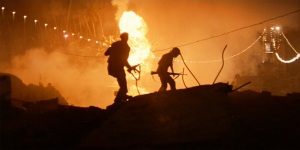
Yet the result is still the same - War has trained men to be killers and not lovers. To take matters into their own hands and treat everyone they see as the villain. There is no room for compassion, only the interest in what we are fighting for.
As Willard proceeds up the river, we begin to learn this, as well as how fragile we are out in the jungle. During another short sequence, Willard and Chef search for mangos in a large forested area. In this place, the roots of the trees dwarf our characters, and the leaves on nearby bushes are bigger than them as well. We are dwarfed by nature.
As we learn these truths about the war and what we are doing out here, so does Willard and his journey up to Kurtz. As he reads more about how a high-ranking official would go totally insane, and he sees innocent people die by machine gun fire, fighting for worthless causes like surfing and nature towering over us, Willard begins to see how Kurtz got to this point.
This makes the build up to Kurtz's reveal all the more menacing and suspenseful. Like I previously mentioned, Willard doesn't arrive at Kurtz's camp until two-thirds of the way through the film. Every once in a while, Willard talks about the missions that Kurtz was sent on and his slow realization of corrupt system he works for and his need to get away from it.
One of the greatest villain portrayals to me is Shere Khan in Disney's "The Jungle Book." Not because Khan is that powerful or possesses that big of a threat, but because we do not see him for the majority of the film, only the legend of Shere Khan. We hear these tall tales of what he did and how everyone is terrified of him, even when he isn't around.
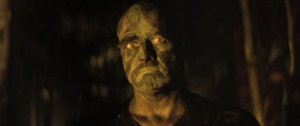
Colonel Kurtz works in much the same way.
Instead of showing us what Kurtz has done, we watch others react to the knowledge of what he's done. We listen to these men that once respected Kurtz for his loyalty to his country, now realizing that he works for no one and could turn on anyone if Kurtz felt like it. We watch as the legend of Colonel Kurtz becomes a reality, and we are terrified by what we've witnessed.
One of the generals Willard talks to in the beginning of the film summed it up best, "There's a conflict in every human heart, between rational and irrational, between good and evil. And good does not always triumph. Sometimes, the dark side overcomes what Lincoln called the better angels of our nature."
In effect, Kurtz has decided that those "better angels of our nature" are small and insignificant compared to the nature of the world. Kurtz does not see it as evil overcoming good, but trusting his instincts to guide his actions.
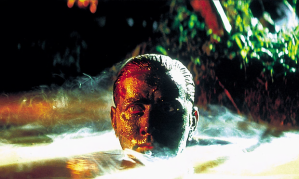
This leads into one of the greatest monologues, where Kurtz talks about how Willard has the right to kill him, but Willard (and the general back in Vietnam) have no right to judge him. In this Shakespearian soliloquy, Kurtz talks about an encounter he had with a village, where he inoculated the children from polio, and the elders wanted no part of that in their children. That something had to be done about it.
"And then I realized they were stronger than we," says Kurtz. "Because they could stand that these were not monsters, these were men. These men who fought with their hearts, who had families, who had children, who were filled with love. But they had the strength to do that. If I had ten divisions of those men, our troubles here would be over very quickly. You have to have men who are moral and at the same time who are able to utilize their primordial instincts to kill without feeling, without passion, without judgment. Because it's judgment that defeats us."
Through the build-up to Kurtz, Willard's slow realization that Kurtz may not be wrong, Willard witnessing the same atrocities as Kurtz, and this monologue, Colonel Kurtz has become my favorite film villain. Because he is not someone attempting to thwart our heroes, but someone whose morals contrast with that of others and upsets the system. It is less about a battle of strength and intelligence, and more about what is right and wrong.
Kurtz has certainly gone mad, but then again, we all go a little mad sometimes.
It also certainly helps that Kurtz is played by Marlon Brando, who is great at everything he does.
What pushes "Apocalypse Now" above all other war films is that it does not shy away from what war does to men's souls. It is less about the Vietnam war, and more about the dark points of human behavior. This could have been set at any time period and any location in the world, and the message would have been clear - those "horrors" are not caused by nature, but by our own selfish desires and the destruction we cause to get them.
Whether those desires are to protect our country, to preserve one's integrity, or to surf, war drives man to an ugly place where right and wrong are blurred and the instinct to survive and thrive precedes all others, even if that means whipping out your fellow-men.
"Apocalypse Now" is the epitome of what I love in cinema - A journey on a grand scale that never skips on the visuals, beautiful cinematography that is eye-popping at almost every opportunity, every scene standing out for one reason or another, having plenty of memorable moments and characters, including the greatest villain I have seen, and a timeless message about war and nature.
That is why "Apocalypse Now" is my favorite film of all time.
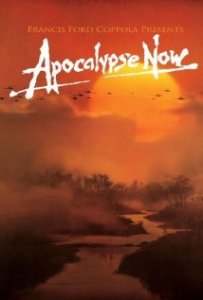

No comments:
Post a Comment